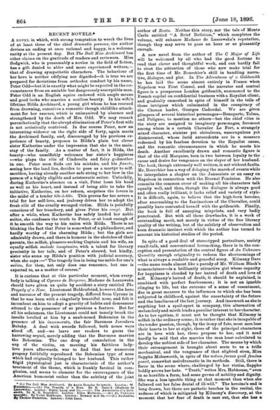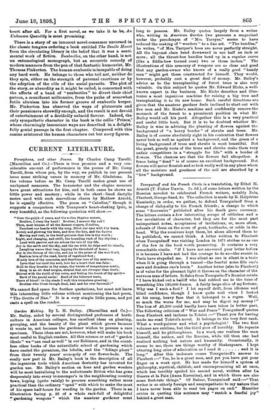RECENT NOVELS.*
A NOVEL in which, with strong temptation to wreck the lives of at least three of the chief dramatis person, the author devises an ending at once rational and happy, is a welcome rarity at the present day. But The Dull Miss Archinard has other claims on the gratitude of readers and reviewers. Miss Bedgwick, who is presumably a novice in the field of fiction, has a gift denied to abler and more experienced writers,— that of drawing sympathetic characters. The behaviour of her hero is neither edifying nor dignified—it is true we are prepared for deviations from orthodox conduct by his name, Peter Odd—but it is exactly what might be expected in the cir- cumstances from an amiable but dangerously susceptible man. Peter Odd is an English squire endowed with ample means and good looks who marries a soulless beauty. In his wife's lifetime Hilda Archinard, a young girl whom he has rescued from drowning, conceives a romantic though childlike attach. ment for her rescuer, which is unimpaired by absence and strengthened by the death of Mrs. Odd. We may remark parenthetically that the abrupt elimination of Peter's first wife is not artistically contrived. In due course Peter, now an interesting widower on the right side of forty, again meets the Archinard family, and, discouraged by his previous ex- perience of beauty, proposes to Hilda's plain but clever sister Katherine under the impression that she is the main- stay of the family. As a matter of fact, it is Hilda, the beauty—who unselfishly welcomes her sister's happiness —who plays the role of Cinderella and fairy godmother in one. Peter soon finds out his mistake, and his fiancee, seeing how the land lies, decides to pose as a martyr to self- sacrifice, having already another safe string to her bow in the person of a highly eligible and aristocratic suitor. Unluckily, during Katherine's absence on a visit, Peter loses his bead as well as his heart, and instead of being able to take the initiative, Katherine, on her return, surprises the lovers in the midst of a tender tete-a-tete. This proves far too severe a trial for her self-love, and jealousy drives her to adopt the fresh role of the cruelly wronged victim. Hilda is painfully conscious of her treachery, and gives Peter his tongs. But after a while, when Katherine has safely landed her noble suitor, she confesses the truth to Peter, or at least enough of it to smooth the way to his union with Hilda. There is no blinking the fact that Peter is somewhat of a philanderer, and hardly worthy of the charming Hilda ; but the girls are admirably drawn, and there is humour in the sketches of their parents, the selfish, pleasure-seeking Captain and his wife, an equally selfish malade imaginaire, with a talent for literary preciosity in her talk, and of Peter's shrewd, but kindly, sister who sums up Hilda's position with judicial accuracy, when she says :—" The tragedy lies in being too noble for one's milieu, for then, not only does one renounce, but one is expected to, as a matter of course."
It is curious that at this particular moment, when every- body is talking of Cyrano de Bergerac, Madame de Laszowska should have given us quite by accident a story entitled The Tragedy of a Nose. Lieutenant Heldenfeind, however, the hero and narrator of the present tragedy, differed from Cyrano in that he was born with a singularly beautiful nose, and felt it incumbent on him to adopt a gravity of habits and demeanour attuned to the possessor of so precious a feature. But for all his sedateness, the Lieutenant could not tamely brook the insults levelled at him by a snub-nosed Bohemian in the presence of his innaniorata, the fair Baroness Jaroslava Bubsky. A. duel with swords followed, both noses were sliced off, and—we leave our readers to guess the harrowing sequel, merely adding that the Baroness marries the Bohemian. The one drop of consolation in the sup of the victim, on meeting his faithless lady- love years afterwards, was to find that her numerous progeny faithfully reproduced the Bohemian type of nose which had originally belonged to her husband. This rather frigid physiological jest is characteristic of the author's treatment of the theme, which is frankly farcical in com- plexion, and seems to clamour for the extravagance of the American humonrist rather than the subtlety of the joint
(1.) The Dull Miss Archinard. By Annie Douglas Be lgwick. Loudon: W. Zeinainann.—(2.) Ti.. Tragedy of a Nos'. By E. Gera, cl (Madame de Laaaowekah. London : Digby, Long. and Co.—(3.1 The Adventures of a Gold. smith. By M. H. Boorchier. London : Elkin Mathews.—(4 ) An Unknown 4,leesality. By Violet Hobbonse. London : Downey acd Co.—(5 ) Sunbeolier. BT nonuis Pinkerton. London: John Lane.
author of Beata. Neither this story, nor the tale of Monte Carlo entitled "A Brief Delirium," which completes the volume, will enhance Madame de Laszowska's reputation, though they may serve to pass an hour or so pleasantly enough.
A new novel from the author of The C Major of Life will be welcomed by alt who had the good fortune to read that clever and thoughtful work, and can hardly fail to rivet the atttention of those who now make trial for the first time of Mr. Bourchier's skill in handling narra- tive, dialogue, and plot. In The Adventures of a Goldsmith he has laid the scene almost entirely in France when Napoleon was First Consul, and the narrator and central figure is a prosperous London goldsmith, summoned to the French capital on confidential business with a Royalist client, and gradually enmeshed in spite of himself in the toils of those intrigues which culminated in the conspiracy of the Chonan leader, Georges Cadoudal. We are given glimpses of several historical personages—Bonaparte, Talma, and Polignac, to mention no others—but the chief roles in the story are assigned to imaginary personages, foremost among whom is a certain Chevalier Le Fort, a strangely mixed character, sinister yet chivalrous, unscrupulous yet disinterested, whose lurid antecedents are in a measure redeemed by his fearless devotion to the Royalist cause, and the romantic circumstances in which he meets his death. Another excellently drawn and romantic figure is that of the old Marquise, torn in two between loyalty to the cause and desire for vengeance on the slayer of her husband. The book, though extremely well written, is not without faults. Mr. Bourchier has a way of delaying the march of events while he interpolates a chapter on the Jansenists or an essay on Napoleon in connection with the Eternal Feminine. He also commits the common error of making all his characters talk equally well, and thus, though the dialogue is always good and often really brilliant, it lacks relief and variety of style- It is difficult, again, to believe that the high-born heroine, after succumbing to the fascinations of the Chevalier, could possibly have contented herself with the goldsmith. Finally, the book is full of annoying misprints, and very badly punctuated. But with all these drawbacks, it is a work of outstanding merit, not merely in virtue of the fine literary quality of the writing, but of the subtlety of observation and keen dramatic instinct with which the author has turned to account his historical studies of the period.
In spite of a good deal of stereotyped portraiture, society small-talk, and conventional lovemaking, there is in the con- ception and presentation of the central figure of An Unknown Quantity enough originality to redeem the shortcomings of what is always a readable and graceful story. Kilmeny Dare —the name reads almost like a parody of Mr. William Black's nomenclature—is a brilliantly attractive girl whose capacity for happiness is clouded by her hatred of death and love of self. Kilmeny's hatred of death, it should be explained, is combined with perfect fearlessness ; it is not an ignoble clinging to life, but the outcome of a sense of resentment, due in great measure to the influences to which she has been subjected in childhood, against the uncertainty of the future and the loneliness of the last journey. And inasmuch as she is anything but a spoil-sport in company, this alternation of melancholy and mirth lends a peculiar interest to her character. As to her egotism, it must not be thought that Kilmeny is selfish in the ordinary sense ; it is rather that she is incapable of the tender passion, though, by the irony of fate, most men lose their hearts to her at sight, three of the principal characters are in love with her, three propose to her, and it need hardly be said that she marries the man least calculated to develop the noblest side of her character. The means by which their estrangement is brought about seem to us a trifle mechanical, and the vengeance of that slighted siren, Miss Sappho Moleswortb, in spite of the notum furens quid femina possit, somewhat melodramatic in its methods. Still, there is force in the scene where, challenged by her victim, Sappho boldly avows her hate. " Truth," writes Mrs. Hobhouse," even in so horrible a form, had some germs of nobility and dignity. She was a less ignoble thing at that moment than when she faltered out her false denial of ill-will." The heroine's end is long drawn, but there are pathetic touches in the recital, the Badness of which is mitigated by Kilmeny's discovery, at the moment that her fear of death is cast out, that she has a
-heart after all. For a first novel, as we take it to be, An Unknown Quantity is most promising.
There is a story of an innocent novel-consumer unversed in the classic tongues ordering a book entitled The Senile Heart from the circulating library in the belief that it was a senti- mental work of fiction. Sunbeetles, on the other hand, is not an entomological monograph, but an eccentric comedy of modern manners from the pen of that fantastic humourist, Mr. Thomas Pinkerton. The human sunbeetle is incapable of doing any hard work. He belongs to those who toil not, neither do they spin, either on the strength of paternal exertions or by the adoption of the role of the social parasite. The plot of the story, or absurdity as it might be called, is concerned with the efforts of a band of " sunbeetlea " to divert their chief patron, a munificent millionaire, from the paths of somewhat futile altruism into his former groove of sunbeetle keeper. Mr. Pinkerton has observed the ways of plutocrats and their pensioners shrewdly enough, and the result is not devoid of entertainment of a decidedly subacid flavour. Indeed, the only sympathetic character in the book is the collie 'Prince,' whose charmingly insouciant ways are described in a delight,. fully genial passage in the first chapter. Compared with this canine aristocrat the human characters cut but sorry figures.



































 Previous page
Previous page